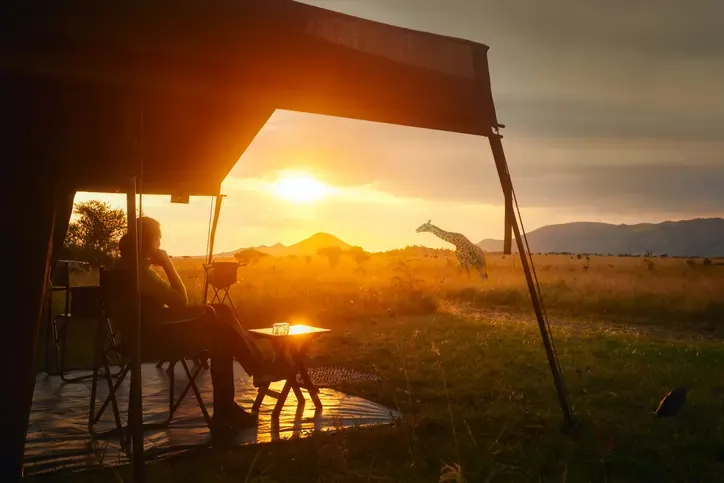
Best luxurious eco-friendly lodge safaris to visit during winter 2023

Embarking on an African safari is a dream for many. Not only does it offer a chance to encounter exotic animals in their natural habitats, but it’s also an opportunity to break away from the mundane and immerse yourself in the breathtaking natural beauty that Africa has to offer. In recent times, tourists have become increasingly interested in eco-friendly lodge safaris that contribute to the conservation of these remarkable African landscapes and habitats.
Why you should do a safari during winter.
Visiting a safari in winter offers a unique vacation experience unmatched by other destinations during the same period. In winter, the cooler temperatures mean animals are more active throughout the day, providing exceptional wildlife viewing opportunities. With fewer tourists, you can enjoy a more serene and intimate encounter with nature. This season often brings clearer skies and better light for spectacular photography. Additionally, the winter months can align with the birthing season for many species, allowing visitors to witness the first steps of newborn animals. Choosing a winter safari can also support conservation efforts during the off-peak season, ensuring a sustainable way to enjoy and preserve the wonders of wildlife.
Here are the top eco-friendly lodge safaris you should consider for your winter 2023 getaway:
- Singita Grumeti, Tanzania
This Tanzanian oasis was established by the Singita Grumeti Fund to protect the local ecosystem and wildlife from human encroachment.
- It’s located near the legendary Serengeti National Park.
- Exciting wildlife viewing opportunities with expert guides.
- Luxurious eco-friendly lodges that blend into the environment.
- Chobe Game Lodge, Botswana
Located within the Chobe National Park in Botswana, this lodge is the epitome of eco-tourism.
- The lodge is fully ecotourism-certified.
- Offers electric safari vehicles and solar-powered boats.
- Home to one of the largest elephant concentrations in Africa.
- Damaraland Camp, Namibia
This community-based safari lodge is world-renowned for its significant contribution to wildlife conservation and community development.
- It’s part of the Torra Conservancy — a successful partnership between Wilderness Safaris and the local community.
- The emphasis is on minimizing environmental impact and fostering local socio-economic development.
- Known for sightings of desert-adapted elephants and free-roaming black rhino.
- Great Plains Conservation, Kenya
This boutique collection of luxurious eco-lodges across Kenya engages guests in tracked conservation tourism.
- Provides a private, intimate safari experience.
- High emphasis on sustainable tourism and nurturing local cultures.
- Works extensively on lion protection and rehabilitation.
Are the trip safe?
A safari in Africa is considered safe due to the stringent measures and experienced professionals that manage these excursions. Tour operators are highly trained and prioritize visitor safety, expertly navigating wildlife interactions while respecting the animals’ space. Safaris are conducted in controlled areas where routes and behaviors of wildlife are well-known and constantly monitored. Camps and lodges are designed with safety in mind, often with secure fencing and guards. Moreover, safari vehicles are robust and provide a secure vantage point for observing animals. Visitors receive detailed safety briefings, ensuring they understand how to act responsibly. With decades of successful tourism history, African safaris have refined their safety protocols, making them a secure option for an adventurous yet safe travel experience.
Essential Health and Safety Precautions for an African Safari
When planning a safari in Africa, medical and sanitary precautions are crucial. Prior to departure, consult a travel doctor for vaccinations like Yellow Fever and medications for malaria prophylaxis. Ensure routine vaccines, such as tetanus and measles, are up to date. Consider Hepatitis A and B vaccinations due to potential food and water exposure. Carry a personal medical kit with antiseptics, bandages, and diarrhea treatment. Use insect repellent with DEET to prevent mosquito-borne diseases, and sleep under treated mosquito nets. Stay hydrated with bottled water, avoiding tap water to prevent waterborne illnesses. Wash hands regularly and use hand sanitizers to maintain hygiene as safari areas might have limited facilities. Lastly, secure comprehensive travel insurance that covers medical emergencies, including evacuation.
Transformative Impacts of Eco-Friendly Safaris on Travelers
Eco-friendly safaris have revolutionized travel by instilling a deep appreciation for nature and conservation among countless individuals. These sustainable adventures minimize environmental impact and support local communities, offering an authentic experience that resonates with travelers seeking meaningful connections with the natural world. Testimonials often highlight the transformative effect of witnessing wildlife in its natural habitat, promoting a sense of responsibility towards preserving these ecosystems. For instance, Jane from the UK remarks, “Seeing elephants roam free changed how I view our planet.” Similarly, Tom from Canada notes, “The eco-safari didn’t just reduce my carbon footprint; it expanded my global awareness.” Such encounters foster a conservation mindset, with many guests becoming advocates for wildlife protection and sustainable living, profoundly impacting their lifestyles and choices post-trip.
Takeaway: Eco-Travel Matters
Embarking on an eco-friendly safari trip can be a thrilling and gratifying experience. Not only do you get to enjoy the adventure of a lifetime, but you also get to contribute to the preservation and restoration of some of the most pristine natural habitats on our planet. The surge in eco-tourism options means you can enjoy your safari getaway with minimal ecological impact and maximum conservation benefits.
Eco-travelling not only stems from a stance of responsibility towards our planet but also underscores the interconnectivity in our world. This winter 2023, make your travel choices count: visit an eco-friendly lodge safari, where wildlife conservation and unforgettable experiences meet.


